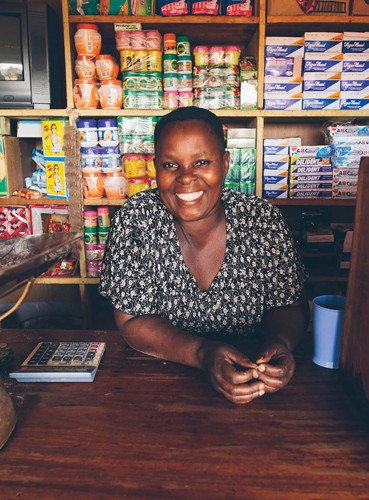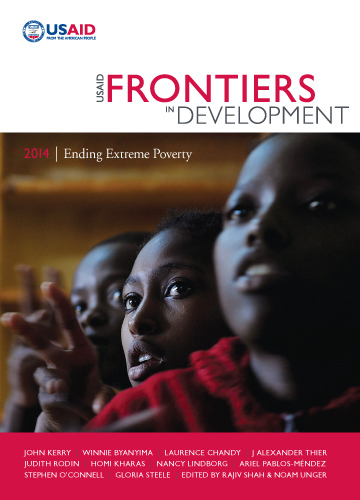Two years ago, USAID convened a forum and published an associated volume of essays, all under the banner of an effort called Frontiers in Development. It was designed to encourage forward-looking, provocative discussion and debate that could advance development policy and practice across the full range of relevant actors.

The ultimate outcomes of such conferences can take time to unfold and are sometimes difficult to attribute. Yet these high-profile efforts are precisely where new ideas, approaches and commitments are teed up and shared, giving stakeholders across the development community opportunities to align politics, policy and practice.
Frontiers in Development served an internal function as well. The associated churn of ideas—especially around science, technology, innovation and partnerships—has informed much of USAID’s work, including the Agency’s approach to bolstering resilience and efforts around its recently established Global Development Lab.
USAID has now chosen to build upon the underlying Frontiers in Development concept. Again the Agency is bringing together many of the world’s brightest minds and boldest leaders to engage in a dialogue on development. Accompanying the dialogue, and contributing to the critical exchange of ideas, is this new book of essays.
The 2014 Frontiers in Development Forum focuses on ways the U.S. and its partners worldwide can help eradicate extreme poverty. It is a particularly interesting and important time for wrestling with this set of issues. As countries and other global development actors come together to shape the post-2015 Development Agenda—a new set of time-bound targets to succeed the Millennium Development Goals—the elimination of extreme poverty by 2030 is likely to be a central aim.
Not only does this goal strike at our collective conscience, it appeals to our ambition and connects to a heartening reality: In 1990, more than twice as many people suffered from extreme poverty around the world than do today.
As several of this book’s essays point out, progress over the past couple of decades has given us reason for hope, and gains against extreme poverty have given us reason to redouble our efforts to work with partners and seek out solutions that can deliver even more progress.
These essays are intended to encourage discussion and provoke debate on critical issues associated with ending extreme poverty.
Secretary of State John Kerry’s overview reflects upon today’s pivotal moment and underscores the connections between development and climate efforts. An introduction then addresses our chosen focus on extreme poverty and how we are approaching this mission. Subsequent sections of the book take readers on a tour through many of the challenging issues and ideas associated with tackling extreme poverty.
As the world continues to make progress in reducing extreme poverty, will this pace necessarily decelerate or might it accelerate? Laurence Chandy and Homi Kharas explain these dueling narratives at the start of a section of essays that examine extreme poverty’s multidimensionality and its connections to key issues like fragility, the importance of focusing on women and girls, and in the case of a piece by Winnie Byanyima, inequality.
Throughout the book, contributions home in on specific programs, projects and country settings. They include interviews with USAID personnel in the Democratic Republic of the Congo and the Philippines.
Development efforts at all levels must contend with the politics of societies and priorities. Where hard choices are necessary, so is leadership. Another set of essays deals with related issues ranging from capacity and culture to corruption. As Larry Garber emphasizes, where extreme poverty remains prevalent, those countries’ policies (and our own) deserve critical attention. So we must ask what it means to think and work politically. This group of essays provides insights from global perspectives as well as local examples, including agricultural subsidies in Malawi, social capital in Liberia and cartels in South Africa and Mexico.
A discussion of supporting competitive markets then leads into a section about catalyzing growth and investment. Stephen O’Connell, for example, uses a historical lens to examine opportunities for pro-poor economic growth and smart redistribution policies. Other essays present ideas, as well as examples, on how to best employ aid to catalyze the sound investments and higher-functioning markets that reduce poverty.
As developing countries and their partners make progress on inclusive growth and targeted efforts to address extreme poverty, it is essential to protect those development gains. This imperative connects the book’s last set of essays. Judith Rodin and Nancy Lindborg advance the concept of resilience and its practical application in the face of undermining challenges such as climate change, disasters, fragility and conflict. Ariel Pablos-Méndez highlights the importance of sustaining momentum through equitable health financing that reduces high out-of-pocket spending.
An essay by Andrea Halverson also addresses health. She uses the example of Côte d’Ivoire to emphasize the significance of investments in family planning and associated economic benefits through demographic dividends. In the final essay, Tony Pipa addresses the importance of adapting to a changed landscape of development finance, a shift that is key to moving forward without sliding backward.
Although this book includes contributions by well-known leaders, thinkers and practitioners, it also includes voices you may not recognize. Some essays were selected through a contest open to USAID staff around the world. After multiple rounds of assessment by reviewers and an editorial board who were unaware of author names, bureaus or missions, 12 essays were chosen.
A majority of the contest submissions and most of the winning essays were penned by authors in the field, including two foreign service nationals. This reflects a welcome level of engagement and a desire among USAID staff to wrestle with ideas in this format.
The essay on agricultural growth and nutrition by Neal Donahue and Ilisa Gertner was selected through an external contest open to the public and run by Devex in partnership with USAID.
These essays do not necessarily reflect the official positions of USAID or the U.S. Government, nor were they selected based on support for official views and approaches. Rather, they are intended to encourage discussion and provoke debate on critical issues associated with ending extreme poverty.
We would like to express our deep appreciation to the organizations and individuals that have made this publication possible. The Frontiers in Development effort, including the event on September 18-19, 2014, was supported through generous contributions by the Rockefeller Foundation, the New Venture Fund and the William and Flora Hewlett Foundation.
Among the many people who contributed to the 2014 Frontiers in Development Forum, several stand out for their leadership and commitment to this publication, including Winston Allen, Hope Bryer, Nan Dearborn, Raquel Gomes, Danielle Lee, Claire McIntyre and Ilyse Stempler.
We are also grateful for the support of the editorial and design teams at Ogilvy Public Relations, Garfinkel + Associates and Graves Fowler Creative and our interns Alex Hart, Kira Setren and Abhik Pramanik.
The many people involved in technical reviews of the essays submitted within USAID and to Devex also deserve thanks. In particular, we would like to acknowledge the leaders across USAID who served on the editorial board for the Agency staff essay contest: Christa Capozzola, Chuck Cooper, Tom Delaney, Larry Garber, Jonathan Katz, Jed Meline, Susan Pascocello, Susan Reichle, Jim Shelton, Alex Thier and Christa White. Others who also helped make this publication possible include Negar Akhavi, Bridget Basirico, Ariana Berengaut, Ken Borghese, Rob Camilleri, Amelia Corl, Clay Doherty, Tom Garwin, Jake Grover, Melissa Hough, Viju Ipe, Kamiar Khajavi, Amitabh Khardori, Ashley Marcus, Carole Muedder, David Strine, Jeff Szuchman, Elisa Walton and Zaid Zaid at USAID and Daniella Ballou-Aares at the State Department. This book and the entire forum planning effort were aided immensely by the model first laid out by Steven Radelet, who led the first Frontiers in Development Forum.
Last, but certainly not least, we are grateful to all the contributing authors in this collection.
Administrator Rajiv Shah
Senior Advisor Noam Unger, Bureau for Policy, Planning and Learning
United States Agency for International Development
August 2014
Frontiers in Development
Ending Extreme Poverty








Comment
Make a general inquiry or suggest an improvement.